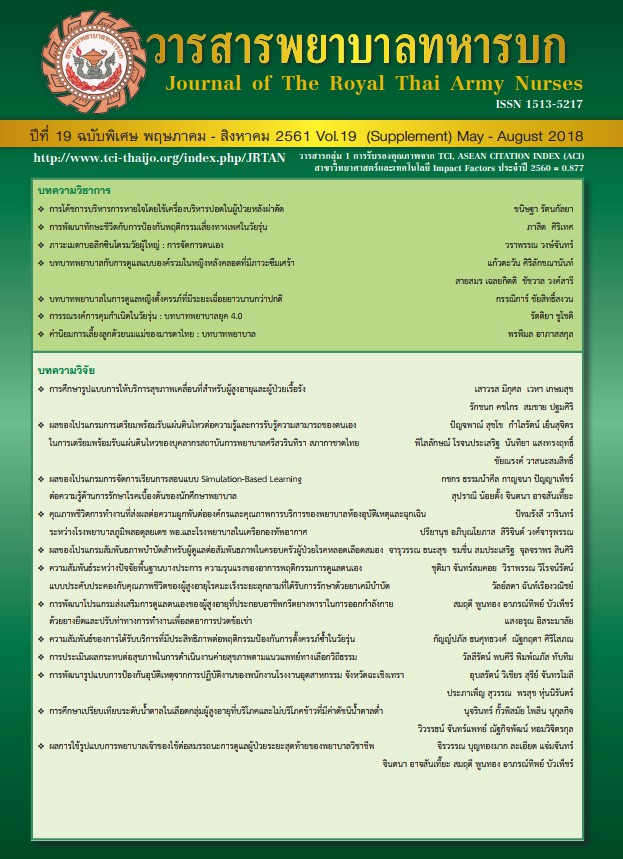การศึกษารูปแบบการให้บริการสุขภาพเคลื่อนที่ สำหรับผู้สูงอายุและผู้ป่วยโรคเรื้อรัง
คำสำคัญ:
ระบบบริการสุขภาพเคลื่อนที่, ผู้สูงอายุ, ผู้ป่วยโรคเรื้อรังบทคัดย่อ
การวิจัยเชิงคุณภาพนี้มีวัตถุประสงค์เพื่อศึกษารูปแบบการให้บริการสุขภาพเคลื่อนที่สำหรับผู้สูงอายุและผู้ป่วยโรคเรื้อรัง โดยการสนทนากลุ่ม (Focus Group) กลุ่มตัวอย่างผู้ให้บริการสุขภาพเคลื่อนที่ ทั้งประเภทจิตอาสาและประเภทธุรกิจเลือกแบบ เจาะจง จำนวน 7 ราย โดยใช้เครื่องมือแนวคำถามการสนทนากลุ่ม วิเคราะห์ข้อมูลโดยการวิเคราะห์เชิงเนื้อหา ผลการวิจัย: พบว่ารูปแบบบริการสุขภาพเคลื่อนที่มี 2 ลักษณะคือ 1) รูปแบบตามลักษณะการคิดค่าบริการ โดยจะให้ บริการทั้งในและนอกโรงพยาบาลได้แก่ ระบบบริการสุขภาพเคลื่อนที่แบบให้เปล่าไม่คิดค่าบริการ ระบบบริการสุขภาพเคลื่อนที่ แบบเสียค่าใช้จ่าย และ 2) รูปแบบตามลักษณะกระบวนการในการให้บริการ ได้แก่ ก่อนมาโรงพยาบาลจนถึงโรงพยาบาล ขณะรับ บริการอยู่ในโรงพยาบาล และหลังออกจากโรงพยาบาลกลับไปบ้าน โดยบริการที่จัดให้ทั้ง 2 รูปแบบมีบริการรถโรงพยาบาลบริการ รับ- ส่งผู้ป่วย และการจัดบริการทางการแพทย์นอกสถานที่ โดยโรงพยาบาลจัดบริการแบบมี Package ในการให้บริการทางการ แพทย์ที่บ้านตามแผนการรักษา ซึ่งจะมีการแจ้งและประชาสัมพันธ์ให้ผู้ป่วยและญาติทราบขณะเข้ารักษาในโรงพยาบาล นอกจาก นี้ยังมีการจัดบริการนอกระบบ เป็นการให้บริการสุขภาพเคลื่อนที่แบบไม่ผ่านตัวแทนหรือโรงพยาบาลแต่เป็นการตกลงกันโดยสมัคร ใจตามความต้องการและความพึงพอใจต่อบริการที่ได้รับของผู้ป่วยหรือญาติโดยการติดต่อกับญาติโดยตรงและการบอกต่อจากญาติ ผู้ป่วยแต่อาจมีข้อจำกัดเรื่องมาตรฐานการบริการที่ไม่สามารถควบคุมได้ นอกจากนี้ยังพบว่ามีบริการสุขภาพที่ช่วยสนับสนุนบริการ สุขภาพเคลื่อนที่ เช่น บริการแบบ “Hotel call” บริการแบบ “Global Doctor” เป็นการให้บริการ Home Health care โดย เฉพาะเจาะจง มีบริการ Pro-nurse, Nursing Home โดยบริษัทที่ตั้งขึ้นมาซึ่งออกแบบให้บริการด้านสุขภาพ มีการสร้าง “กลุ่ม line” ให้พยาบาลเข้ามา Join group ให้บริการและมีการส่งต่อเวรเพื่อให้บริการสุขภาพเคลื่อนที่
Downloads
เอกสารอ้างอิง
Foundation for Thai Elderly Research and Development Institute. The Situation of Thai Elderly in 2014. Bangkok, Foundation for Thai Elderly Research and Development Institute; 2014.
Department of Elderly Affairs. Strategic Plan of the Department of Elderly Affairs, 2017-2021. Bangkok; 2014. (in Thai).
National Statistical Office. The 2014 SURVEY OF THE OLDER PERSONS IN THAILAND. BANGKOK: National Statistical Office; 2014. (in Thai).
Witchawut C, Chayawan N, Wongchai Y, Intrarasombat P, Thamnawat N. Review and Synthesis of Thai Elderly Knowledge, 2002 - 2007 .Foundation for Thai Elderly Research and Development Institute; 2010. (in Thai).
Sasus S., Chuwattana T., Pukdeeprom T., Aroonsang P. Study of long-term care facilities situation in Thailand. Department of health and department of health the foundation for Thai elderly research and development; 2009. (in Thai).
Dumri L. Development of quality of life for the elderly: Development of Prototype Area and Key Factors Foundation for Thai Elderly Research and Development Institute; 2013. (in Thai).
Srithamrongsawat S, Bundhamcharoen K. Synthesis Report on Long-Term Care for the Elderly in Thailand. Foundation for Thai Elderly Research and Development Institute; 2010. (in Thai).
Wivatvanit S, Jitapunkul S, Kespichayawattana J. A study of the readiness and needs of patients who have been discharged from hospitals in general hospitals and hospital centers, Ministry of Public Health. One day research report, Thai Elderly Research and Development Foundation. 2012.
Jitapunkul S. Research and Development Strategy Towards Aging Society of Thailand. Journal of Advanced Science and Technology. 2015; 1(1): 80-91.
Suwandechochai R, PathomSiri S, Amaruchkul K. A study of needs and models of mobile health services. Full research reports. Bangkok: The
Thailand Research Fund. 2013. (in Thai).
Koshakri R, Kasemsuk W, Rerkluenrit J. The outcomes of program for improvement of Health Volunteer’s Ability in Educational Home Visit for Diabetes People without Complication in Communities. Journal of The Royal Thai Army Nurses. 2014; 17(1): 141-147 (in Thai).
Kaewkanya J. Legal education review program and development mechanisms in local government and community in welfare organizations and facilities for the elderly. Full research reports. Foundation for Thai Elderly Research and Development Institute. 2012. (in Thai).
Chesnay MD, Payne H. Mobile clinics as outreach to the underserved, in M.D. Chesnay and B.A. Anderson, Caring for the vulnerable: perspectives in nursing theory, practice and research, Burlington: MA, Jones & Barlett Learning, 2012: 237 – 256.
Crouse H.L. et al. Utilization of a mobile medical van for delivering pediatric care in the Bateys of the Dominican Republic, International Journal of Emergency Medicine. 2010; 3(4): 227 – 232.
International Committee of Red Cross (ICRC). Mobile health units: methodological approach, Geneva, Switzerland. 2006.
Carmichael M. (2010). A little van with a big impact: this RV could change the face of health care in America. (in Thai).
Malone S. (2010). Mobile clinics seen as a way to cut U.S. health bill. [cited 2014 August 11].
ดาวน์โหลด
เผยแพร่แล้ว
รูปแบบการอ้างอิง
ฉบับ
ประเภทบทความ
สัญญาอนุญาต
บทความหรือข้อคิดเห็นใดใดที่ปรากฏในวารสารพยาบาลทหารบกเป็นวรรณกรรมของผู้เขียน ซึ่งบรรณาธิการหรือสมาคมพยาบาลทหารบก ไม่จำเป็นต้องเห็นด้วย
บทความที่ได้รับการตีพิมพ์เป็นลิขสิทธิ์ของวารสารพยาบาลทหารบก
The ideas and opinions expressed in the Journal of The Royal Thai Army Nurses are those of the authors and not necessarily those
of the editor or Royal Thai Army Nurses Association.







